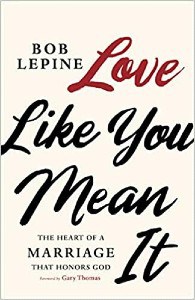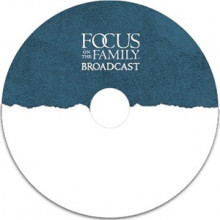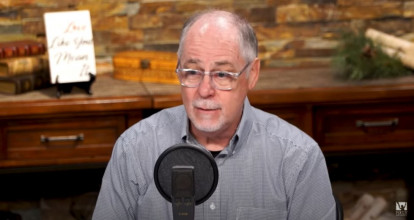
The War of Words
In this Adventures in Odyssey drama, a carelessly uttered word from Eugene creates havoc as it becomes the fashionable insult, resulting in a lesson about the power of words.
Home » Episodes » Focus on the Family Broadcast » Showing True Love to Your Spouse
John Fuller: Well, on this Valentine’s Day edition of Focus on the Family, we’re gonna be exploring the topic of love in marriage and what that love should and could look like in the day-to-day relationship you have with your spouse. Your host is Focus President and author Jim Daly, and I’m John Fuller. And Jim, we’re gonna start by reviewing some rather goofy ways-
Jim Daly: (laughs).
John: … that couples have (laughs) expressed their love for each other. These are like bad Valentine’s Day cards.
Jim: You’re putting one of these in your card to Dena.
John: Well, I… (laughs).
Jim: I know you’re going to.
John: You’re the macaroni to my cheese.
Jim: (laughs).
John: Will you be my Valentine, please?
Jim: At least it rhymes.
John: Yeah.
Jim: How about this one? They say Disneyland is the happiest place on earth. Obviously, they’ve never been in your arms.
John: Aw. That would win Jean over in a heartbeat. Yeah.
Jim: Okay, what about you?
John: Words cannot espresso how much you mean to me. That’s for the coffee lovers, obviously.
Jim: Uh, love is sharing your popcorn. You can have my popcorn.
John: (laughs).
Jim: I don’t care.
John: Oh. How about this? Darling, you’re like a Sharpie. You’re super-fine.
Jim: I like that.
John: (laughs).
Jim: And of course, the last one, let’s commit the perfect crime. I’ll steal your heart and you steal mine.
John: Oh, my word.
Jim: Okay, those are some lines-
John: (laughs).
Jim: … you can use in your Valentine’s card today.
John: Yeah. And then let us know.
Jim: (laughs).
John: Just, uh, Facebook us or send us an email or something. Let us know how that worked out for you.
Jim: (laughs). Maybe come up with your own. That would be an encouraging idea. Uh, listen, it’s obvious some people do have strange ideas about love and (laughs) we’ve mentioned a few of ’em. So we’re going to, uh, get some help on this topic today by a well-known radio personality, Bob Lepine, who is also a pastor, a speaker, an author, and, uh, does so much to communicate, uh, the importance of love within the kingdom. Bob, welcome, uh, back to Focus on the Family.
Bob Lepine: Great to be here, Jim, John. Great to be with you guys.
Jim: Everybody just recognized your voice.
Bob: (laughs).
Jim: How many years did you work with Dennis Rainey at Family Life?
Bob: So, I- I started in 1992. W…
Jim: Wow.
Bob: … we- we put Family Life Today on the air in ’92. And, uh, and then Dennis, uh, stepped away back in 2018 and-
Jim: Yeah.
Bob: … continued to work with Dave and Ann Wilson for a season. And now they have the con and they are, uh, full speed ahead-
Jim: Yeah.
Bob: … with Family Life Today and doing a great job.
Jim: Yeah. W-
Bob: And I’ll just say, we- we have been allies and partners with you guys over the years on so many things and we really look at the- the partnership, what we’re doing together to advance the cause of Christ as it relates to marriages and families. We’ve cheered you on, you’ve cheered us on. So, great to be here and be on Focus on the Family.
Jim: Yeah, it’s good.
John: Yeah. And we consider Family Life a great ally and your role, of course, very significant over the years. Bob, uh, also was a member of the National Religious Broadcasters Board. He’s written a number of books. We’re gonna be talking about one book in particular that, um, I think really is solid. It’s a Biblical perspective on marriage. It’s called Love Like You Mean It: The Heart of a Marriage That Honors God. And we have copies of that here at Focus on the Family. Just call 800, the letter A, and the word FAMILY, or stop by focusonthefamily.com/broadcast.
Jim: Bob, uh, uh, you know, going back to the ’60s, and you cover a bit of this in the book. I mean, the whole, uh, free love kind of thing. The impact of that and the continual wave effect-
Bob: Yeah.
Jim: … of that, uh, ’60s, ’70s era, we’re certainly, I think, still feeling the ramifications of that. Uh, but it feels like in the last 10, 20 years, we’ve moved so quickly away from a definition of marriage.
Bob: Mm-hmm.
Jim: What’s happened?
Bob: Well, I- I think in the ’60s we uncoupled marriage and sexuality then said these two don’t necessarily have to belong together, you can have one without the other. That uncoupling was deleterious to families, to kids, to the culture. I mean, it’s just had a- a tremendous impact on where we are today. And then in the last 10 to 15 years we’ve said, in fact, what is marriage anyway? Let’s- let’s stop and think. And, uh, I’m old enough to remember the TV show Murphy Brown where they said-
Jim: Right.
Bob: … marriage is just any people who live together and love each other. Well, they were using a cheap view of love that won’t sustain, uh, a marriage. They- they were mischaracterizing, in fact, this is what’s at the heart of, uh, what I wrote in Love Like You Mean It, is the idea that we have a, uh, a shallow and sandy view of what love is. And you try to build a marriage on that kind of sand and it’s not gonna- it’s not gonna stand.
Jim: Yeah.
Bob: You need something tougher and deeper, and the good news is the Bible gives us that tougher, deeper definition.
Jim: Now people listening are gonna say, well that’s wonderful, Bob Lepine knew that from the get-go.
Bob: (laughs).
Jim: Bt when you met-
John: (laughs).
Jim: … when you met Mary Ann, I think in a cafeteria line, which is great. I love this, huh?
Bob: (laughs).
Jim: Would you like an extra scoop of applesauce (laughs)-
Bob: (laughs).
Jim: … or (laughs) I don’t know how that worked but, uh, were you in college or how did you, uh, bump into Mary Ann?
Bob: Uh, we- w… we were in college together. Both of us were working with Young Life, as volunteer leaders-
Jim: Oh good.
Bob: … with Young Life. And we were on a retreat weekend, and we were in line for dinner. And I was a freshman. This was, uh, beginning of my second semester, my freshman year. I’m standing in line and there’s a- another co-worker, a- a senior girl who was in- in line with me and she said, “You’re a freshman?” And I said, “Yeah.” She said, “Oh, I thought you were like a junior or senior.” Okay, so my head is swelling.
Jim: Yeah (laughs).
John: Just what you want to hear.
Bob: I’m thinking, this is awesome. And- and Mary Ann was a few people back.
Jim: Uh-huh.
Bob: But she overheard the conversation, and so a few minutes later she said, “You’re a freshman, huh?” And I said “Yeah. What did you think?” Like she was gonna lay it on thick, too.
Jim: (laughs)
Bob: And she said maybe a sophomore. And I went, “Okay.” So
Jim: Here’s a woman who knows reality.
Bob: That’s right. So from that first little, uh, jab, uh, uh, were the seeds of what became our relationship. Now the thing is, we started dating and we’d been dating for like three weeks when I was already saying, you know, I love you. I had no idea the power, the weight of that word. I meant I like being around you. It’s better being’ around you than when I’m not around you. You make me feel good. So I was just saying’ I love you like I would say I love ice cream and I love little baby pigs, you know, whatever.
Jim: And that’s what’s so good about it, because you learn from your own experience. You, you, you, those terms that are, should be weighty…
Bob: Yes.
Jim: And carry something, you, you, you were throwing’ ’em around.
Bob: I was so careless with it, and it threw her off, because she’s saying, “What are you saying to me?”
Jim: (laughs)
Bob: I told my boys as I was raising them, the first time you say I love you to a young woman, the next thing you say is, “Will you marry me?”
Jim: Wow.
Bob: Okay? So…
Jim: Yeah.
Bob: That, that’s how serious this is, when you say I love you. Don’t say it until you’re ready to say next, will you marry me?
Jim: Yeah. Let me ask you, in, in, in that regard. What was happening? I mean, you’re a believer, you’re working for Young Life.
Bob: Mm-mm.
Jim: I mean, (laughs) you’re graduating college by this point, but when you married Mary Ann, but, but what gave you that premise? Wha-, why did you feel so light-handed with it?
Bob: Pop songs and rom coms.
Jim: Huh.
Bob: Honestly. You look at this say we have a romantic view of love that has been shaped by pop music…
Jim: It’s true.
Bob: And romantic comedies in the movies. So you watch the Hallmark Channel and that’s where we’re catechized on what it means…
Jim: Hm.
Bob: … for love and marriage, and that’s where we get that sandy view of, of what love looks like, and if that’s as deep as it goes… I mean I had a highly romantic view. So if I’m having a certain feeling, I just say, you know, man, I, I love you. I love this. I love… The Bible takes a completely different tact. In fact, Paul, when he writes First Corinthians 13, which was the, the kind of of the core of this book, What Does Real Love Look Like? He’s scolding a church for a failure to love. We, we read this passage at weddings, and we say love is patient. Love is kind. And we put it in romantic terms.
Bob: Paul wasn’t saying it that way. He was saying, “Look, guys, love is patient. It’s kind. It’s not self-seeking. It doesn’t demand its own way. Doesn’t keep a record of wrongs.” I mean, he’s scolding these people for their lack of love.
Jim: Hm.
Bob: There’s work boots you gotta put on if you’re gonna make a relationship be a truly loving relationship.
Jim: And that’s so good, we’re gonna get into that over the half hour together that, uh, you know, what love actually means. But in that regard, um, when you, uh, think of engaged couples, you encourage them in the book to read the fine print. I kind of had two responses to that. One, I get it. Secondly, there’s already a lot of fear and, and hesitation in family formation.
Bob: Yeah.
Jim: With 20, 30-somethings that are worried. So I was a little concerned about that. But it’s wise to read the fine print. What did you mean by that?
Bob: Uh, well, I, I think there are two different, um, realities when it comes to thinking about marriage as engaged couples. You need to be aware that marriage is, in my view, a wonderful, glorious, it’s the most magnificent, it’s the deepest kind of relationship that we can have as human beings. It’s wonderful. And it’s the hardest relationship you will ever have.
Jim: Yeah.
Bob: Those two truths are, are simultaneously there. So if you go in with a Pollyanna, oh, this is just gonna be wonderful. You go in with the, the, what the Beach Boys taught me. It’s gonna make it that much better when we can say goodnight and stay together. Wouldn’t it be nice?
Jim: Mm-mm. (laughs)
Bob: So that, if you just think this is go-, dating is good, marriage is gonna be double good. Right? That’s, that’s the naïve view. The other view is what, what you’re talking’ about, Jim. And I think a lot of young people today who watch their parents’ struggle.
Jim: Yeah.
Bob: Or divorce, or not make it work, they look around and go, “Who could do this? Can anybody do this? My friends can’t. My parents couldn’t.” And they’re really afraid that this is an institution that is impossible to be good at, and so we have to say, no, you can thrive in a marriage relationship, and it’s gonna be hard.
Jim: Yeah.
Bob: And let’s embrace that and, you know, the-, the-, things that are hard are often the best things in life, so.
Jim: Yeah. And it, you know, Bob, you, you mention this. I, I don’t think necessarily the science of it, but, uh, you know, neuroscientists have looked at infatuation and love to the best of their ability, MRI scans, all that kind of thing. That typically lasts a year and a half to two years.
Bob: Yeah.
Jim: And then that evaporates.
Bob: Yeah.
Jim: It’s just normal. You get into the routine of relationship.
Bob: Yeah.
Jim: In the book, you mention there’s a difference, uh, where in English we have the one-word love, but in Greek, we have eros and agape love.
Bob: Mm-mm.
Jim: And there’s a distinction there. And you’re pointing to this. Eh, drill into this. This is like Christian bootcamp here.
Bob: Yeah.
Jim: Where we really have to understand this distinction that even scientists recognize in our brain science.
Bob: Right. Yeah, so the, the Greeks had a variety of words. They had the word storge that talks about family love and family bonding. They had the word philos which is a word for deep friendships. David and Jonathan were knit together as brothers. They had a philos… Philadelphia the city of brotherly love and then there’s eros which we get the word erotic, it’s for sexual love and sexual desire. And then there’s agape. And the interesting thing, and I didn’t know this till I was digging in and studying this and writing the book, agape was essentially a Christian invention as a word.
Jim: Huh.
Bob: J. I. Packer said that this word was not prevalent in Greek literature outside and before the, the Bible came into being. This idea of self-sacrificing, self-denying love, the greater love that lays down its life for its friends, it, it didn’t exist in the culture. The, the Greeks and Romans thought humility and laying down your life for somebody else was weakness. Not strength. And Christians come along and say, “This is the kind of love God has for us. He sends his son who dies for us. We should have this same kind of self-emptying, self-sacrificing love, this agape love.” It’s a completely different kind of love. There’s a very I love in, in First John 3, verse 1, where John says, “Behold, what manner of love the father has given to us.” And that world behold means take a good hard look. You’ve never seen anything like this before. This is a foreign kind of love. And he says, “This is what God has lavished on us, that we should be called sons of God.” And then he goes on to say, “And this is how we love one another. This is what Christian’s do. We look at God’s love for us, it pours into us, we spill it out into the lives of others.”
Jim: Man, that is so good, Bob. I mean, this is, uh, Christianity 101 right here.
Bob: Mm-mm.
Jim: The fact that, um, you know, that the Lord brought this word into existence around the Christian faith, that right there is exciting.
Bob: Mm-mm.
Jim: And very intriguing. And very like God.
Bob: Yes.
Jim: To say, “Oh, I have a different idea of what love means.”
Bob: Mm-mm. Exactly.
Jim: The difficulty, Bob, there’s so much of our flesh in us and I mean the whole thing seems to be how God can empty us, as we become more like him…
Bob: Mm-mm.
Jim: … we become less selfish, uh-, right down the line.
Bob: Yeah.
Jim: So this agape love that you’re describing, it might be even easy to show it to others out there. You know, you could take care of somebody who has a need, a neighbor who has a need. It sometimes becomes really difficult to show it to your spouse.
Bob: Oh, I don’t know how many times
Jim: And it, button pushing, all of it. So why the most important person in our life, do we struggle sometimes showing the greatest love that we should show?
Bob: I’ve talked to couples who say, we’ll be in the middle of some intense fellowship…
Jim: (laughs) ’cause Christian’s don’t argue. (laughs)
Bob: So there’s, there’s a fight going’ on between the husband and wife and they’re, they’re loud and they’re, they’re angry, and then the phone rings and all of a sudden, they go, “Hello?”
Jim: (laughs)
Bob: They just switch it off. So we can be nice to the person on the phone or the person at the door, we can shut it all down, but I, I think this goes to the fact that the people who are close to us are the ones who can, can wound us most deeply. And so we often have this kind of a, a reaction to the wounding.
Jim: Hm.
Bob: But it also goes, Jim, to what you’re saying. The flesh wars against the spirit. So Paul in Romans 7 said, “There are things I wanna do that I don’t do. There are things I do I, I hate.”
Jim: Right.
Bob: “Wretched man that I am.” This is our battle. And so to say we wanna have agape love, you don’t just say, “Well, that’s a nice thought. I think I’ll do that tomorrow.”
Jim: (laughs) Right.
Bob: No, you have to strap this on every day. You gotta get up every day and say, “I need a self-emptying. I need to have this mind in me that was in Christ Jesus who emptied himself for us.”
Jim: Hm.
John: And if you don’t have that mindset when you wake up, the Lord will bring opportunities through your spouse right?
Jim: Exactly right.
John: We’re, uh, we’re privileged to talk with Bob Lepine today. Love Like You Mean It; the Heart of a Marriage that Honors God is his book, and, uh, we have copies of that here at Focus on the Family. Our number is 800-A-FAMILY or stop by focusonthefamily.com/broadcast.
Jim: Philippians 2 is also an area of scripture. I think we’ve got First Corinthians covered. But Philippians, 2, what is that verse and why is it significant when it comes to marriage?
Bob: Well, it, this, this is a lesson I learned early on. When Mary Ann and I were dating, she came to me at some point, we’d been dating for a couple years. She said, “What do you think about us memorizing some Bible verses together?” And here’s what I thought. I thought, well, why would you memorize ’em? I mean, if you need ’em they’re in the book you can just go look ’em up.
Jim: (laughs)
John: (laughs)
Jim: See reference.
Bob: Memorize?
Jim: Yeah.
John: Did you say that?
Bob: I didn’t, no, ’cause we’re dating.
Jim: (laughs)
Bob: We were dating. So I said, “Oh, that’s a great idea. Yeah, that’s a, that’s wonderful.” I, I’m thinking, it’s crazy, but okay I’ll go along with that…
Jim: (laughs)
John: to get the girl.
Bob: Then I said, “Did you have any verses in mind?” And she said, “Well, I was actually thinking about a whole chapter.” Well, I, I did this bug-eyed look like, like, “A chapter? Are you out of…? Who memorizes a chapter in the Bible?” But I said to her, “Wow.” You know, I didn’t say much more than that. Wow. I said, “Did you have a chapter in mind?” She said, I was thinking of Philippians chapter 2.” And I went, “Oh.” Like I knew what that was.
Jim: (laughs)
John: (laughs)
Bob: I didn’t know if it was…
Jim: I love that honesty.
Bob: I didn’t know if it was Old Testament or New Testament. I was still, “Oh, okay.” Well, I think she’d picked it up because of the boy she was dating. ‘Cause it’s all about humility. That’s what Philippians two is all about. So we started memorizing this together. And I don’t know if we got all of the way through, but when we got to verse three, it kind of locked on. I memorized it quickly, I, I didn’t have to work at it. I think it was just God saying, “You’re gonna need this for the rest of your life.” Do nothing from selfishness. And I’ve done the work now. The Greek word for nothing means nothing.
Jim: (laughs)
Bob: Okay. Do nothing.
Jim: Not something.
Bob: … from selfishness or empty conceit, but with humility let each of you regard one another as more important than himself. And it goes on to say, have this mind in your, or, or do, do not merely look out for your own interests, but also for the interests of others. I’m convinced 90% of the marriage problems I’ve seen in my life, you apply that verse. You say, “Have this mind in you, look out for the other-, the interest of the other’s, make it your goal to please someone else,” you’d fix most of the problems. Now there are, there’s a 10% factor out there, right? But most of the problems we have in marriage are because of pride and selfishness. And we’ve got to attend to that, and we’ve got to be cultivating humility. It’s really foundational to what healthy love looks like in a marriage.
Jim: It’s so true, Bob. I mean, you are hitting it. And I think, that’s exactly why the, you know, we do a four-day intensive, Hope Restored. And they have an 80% success rate. And these are, a lot of them have signed divorce papers, so they’re done.
Bob: Mm-mm.
Jim: But the reason it’s successful is it gets to these basic principles, and that’s what you’re gonna learn there. Uh, you know, and rather than go and spend that time, start applying what Bob’s talking about…
Bob: Yeah.
Jim: … would be my recommendation.
Bob: And I love the way that those intensives have helped so many couples over the years and that, the testimonies I’ve heard from people who have been through them, and, uh, we’ve sent people, I mean, I, I…
Jim: Yeah.
Bob: … have friends who have, have said, “We don’t know how, we’re stuck.” And I say, “Go do the hard work. You, you’ve got such a, a history of accumulated pain and bad habits and patterns. Let some people help identify those and then help replace bad habits with good habits.” Of course, it’s all gonna come back to an understanding of the gospel as, as the foundation, but that’s [inaudible]
Jim: That’s really it and that’s what they apply and that’s what’s so exciting is that it, and this is roughly 40 hours.
Bob: Yes.
Jim: So you can do in 40 hours, uh, what will, uh, uh, change your life.
Bob: Right.
Jim: And keep your commitment to Christ intact.
Bob: Mm-mm.
Jim: Right? With that love for better or for worse, uh, verse that you talked about, or commitment to each other. Let me ask you, Bob, uh, another concept that you mention in the book is, uh, the fact that marital love needs to be tenacious. I love that.
Bob: Mm-mm.
Jim: Uh, you compare that to the bulldog. (laughs)
Bob: (laughs)
Jim: I think I get that but describe what you’re going’ after there.
Bob: Yeah, it was a Winston Churchill quote.
Jim: Okay.
Bob: Churchill was the one who said, “A bulldog’s nose is slanted backwards so that he can keep breathing without letting go.”
Jim: Yeah. (laughs)
Bob: And, and that’s a great, you, you latch on, and you keep breathing without letting go. It, it’s that kind of tenacious bulldog love…
Jim: Hm.
Bob: … that says I’m in this. The end of the passage in First Corinthians 13 says, “Love never fails, never quits, never gives up. It, it believes all things, bears all things, hopes all things, endures all things.” There is this tenacity with love that says, “I’m not going’ anywhere.”
Jim: What…
Bob: I’ve said to couples for so many years. I’ve said, if, if I told you today the car you get when you get married, this is the only car you’ll ever have for the rest of your life.
Jim: That’s a problem. (laughs)
Bob: Well, two things would happen. First of all, you would take better care of that car than you take care of your car now, because you go, I gotta take care of this, this is the only one I’ll ever have.
Jim: And you would’ve chosen more wisely.
John: (laughs)
Jim: (laughs) The Pinto is not gonna make it. (laughs)
Bob: But the second thing is, when it breaks, you’ll take it in and get it fixed.
Jim: Yeah.
Bob: ‘Cause you need the car.
Jim: How interesting. Yeah.
Bob: Well, if we would start off by saying this marriage is the only marriage, I’m ever gonna have…
Jim: Hm.
Bob: … and so I’m gonna take better care of it, and when it breaks, ’cause it, you’ll, go see a counselor, go see your pastor.
Jim: Yeah.
Bob: Get some help. Get some… You can fix it. Don’t just… Most couples wait until they’ve lost hope.
Jim: Mm-mm.
Bob: And they don’t know where to turn. No, when things get bad, go and say look, we need a tune up, uh, an alignment. We’re in the ditch and we need a tow truck to tow us out.
Jim: That is so good. And I, I don’t know what keeps people from going. Um, and it, it makes total sense, you know?
Bob: Pride keeps a lot of people.
Jim: There is, it’s a pride thing.
Bob: It really is, yeah.
Jim: Bob, I was gonna jump on that bulldog analogy, because in so many ways, it, uh, the older I get, the more I realize the Lord’s simplicity with life.
Bob: Hm.
Jim: He shows us his love through marriage, through-, and what he wants to do with us.
Bob: Yeah.
Jim: He shows us humility through child rearing (laughs) right? You think you’re so good?
Bob: Yeah.
Jim: Well have a couple of kids and we’ll see how that goes.
Bob: (laughs)
Jim: The point of that is the Lord’s love is like that bulldog.
Bob: Exactly.
Jim: He’s never gonna let go, in fact, Paul says that. “He will never let you go. He’s gotcha.”
Bob: And, and what a great confidence we have knowing that we are safe and secure. When, when a couple knows, “Look, I’m not going’ anywhere, you’re not going’ anywhere. There’s a security here. Now we’ve got issues and we can fix ’em.” But I, I’ve said to couples over the years, when you pull out the D word, and you say, you know, maybe it’d be better if we’d never gotten married.
Jim: Right.
Bob: Or maybe we, we ought to get a divorce. What you’ve done, you’ve threatened the entire foundation. Now nobody feels safe in that marriage anymore.
Jim: Hm.
Bob: Because if I do something’, you may be outta here. But when Mary Ann knows I’m not going’ anywhere. We’re, we’re stuck, I’m not sure how we get outta this, we’re gonna get some help, but I’m not goin’ anywhere. You can’t get rid of me.
Jim: Yeah.
Bob: And, and I’m here for you. There’s a safety and a security there that says, okay, we can get through this.
Jim: You know, Jean and I had that earlier moment, second, third year of our marriage. And it was, you know, I said to her that it’s either gonna be miserable or happy.
Bob: Yeah.
Jim: So let’s choose happy.
Bob: Yeah.
Jim: (laughs) You know?
Bob: Yeah.
Jim: But there’s no exit plan.
Bob: That’s right.
Jim: And, uh, that’s the truth. Uh, bottom line. It’s impossible to love our spouse unconditionally. I mean, maybe in heaven (laughs) you know?
Bob: Right.
Jim: We’re gonna have that ability to express unconditional love, because we’ll get it from the Lord in that perfect environment, but in this life and the way we work and the way with operate with the sin-nature still at war with our spirit, it’s hard to be unconditionally loving toward everybody. Uh, unless we have that regular supply from God. And it’s still gonna be imperfect even in that environment. Perhaps we’ll get to 98% octane.
Bob: (laughs)
Jim: Describe what you were telling us there in the book.
Bob: Yeah, there, there is this ongoing war that will be present. Our, our, our motives will always be mixed motives.
Jim: Yeah. (laughs) so true.
Bob: We can say I’m doing this sacrificially, but there’s always this little hidden, what’s in it for me? That’s just a part of t-, it, it’s endemic to the human condition. But couples need to understand that our love for one another needs to flow out of the, the supply of love that we receive from God. I, I, I think a lot of times couples think, okay, I can love you as, as long as you fill my love tank, then I’ve got love to pour back to you and we just kind of slosh our love tank, love supply back.
Jim: (laughs)
Bob: Well, the problem is some spills out over time, and we got less and less to give to one another. We can’t depend on each other as the source for the love we give to one another.
Jim: Boy, that’s good.
Bob: We have to depend on an outside source, and so I, I think of this like I think of, I don’t know if you ever grew up with a cistern or with a rain collector, you know, uh, but, but a cistern is where you’d fill up the, the water supply for the house with the rain that comes off the roof. And if it’s raining well, then the cistern is full, and you’ve got plenty of water. If it’s a dry season, the cistern dries up. The good thing about God’s love is he rains it, he pours it lavishly on us, so that we always have access to an endless supply of God’s love for us, and it’s out of the overflow of God’s love for us that we spill it out onto one another. So if you’re saying, “I just don’t feel love for my spouse.” I would say, “Go fill yourself up on God’s love, get God’s perspective on your spouse, because God loves your spouse. Fill yourself up with God’s love for you, get God’s perspective of his love for your spouse, and then let God’s love for you, poured into you, spill out onto your spouse, and now you’ve got a whole different love source for your marriage.”
Jim: Man, Bob, this has been so full of wisdom. I’ve really enjoyed this.
Bob: I have too.
Jim: It’s been great. I hope people have caught it. Um, it’s not complicated. Be humble, think of others, think of your spouse…
Bob: Yeah.
Jim: … more highly than yourself, and things are gonna go well. And that’s what your book, Love Like You Mean It, really addresses. Love the scriptures that you have talked about. Um, thanks for being with us. And let us encourage you to get a copy of the book, uh, if you can make a gift of any amount, we’ll send it to you as our way of saying thank you for being part of the ministry. If you can’t afford it, uh, we’re into getting this information into your hands, uh, just let us know that you need it and you can’t afford to help us, and, but we want to help you and we’re gonna trust others will help us. So do that, we’ll get the book into your hands as our way of saying thank you.
John: Yeah, donate as you can, a monthly pledge is great. Be a sustaining member of this ministry, uh, by making a monthly donation, or a one-time pledge. Either way, we’ll send Bob’s great book, Love Like You Mean It, and, uh, our number is 800, the letter A, and the word FAMILY. Or stop by focusonthefamily.com/broadcast. And while you’re at the website, we have a free marriage assessment and also have information about Hope Restored, the marriage intensives that we’ve been so privileged to offer to folks. Coming up next time on focus on the family, sometimes it is hard to have the relationship you’d like with your daughter, and you just don’t know what’s going on inside her head and heart. Join us as we talk with Jessie Minassian about helping your teenager get along with the family.
Preview:
Jessie Minassian: More often, we’re seeing these teens who, surprise, have brokenness in their families and they don’t wanna repeat that for the next generation, and so they’re wondering how do I get along with my family first of all, but then also how do I keep this from entering into my future family?
End of Preview
John: On behalf of Jim Daly and the entire team here, thanks for joining us today for Focus on the Family. I’m John Fuller inviting you back as we once again help you and your family thrive in Christ.

Bob Lepine is best known to radio and podcast listeners as the longtime co‐host of FamilyLife
Today® and as the on-air announcer for Truth for Life with Alistair Begg . In addition, he serves on the Board of Directors for the National Religious Broadcasters and the Great Commission Collective. Bob is the author of Love Like You Mean It: The Heart of a Marriage That Honors God and The Christian Husband. He, and his wife, Mary Ann, have five children and nine grandchildren.

Receive Bob's book Love Like You Mean It for your donation of any amount!

The Focus on the Family Marriage Assessment is designed to evaluate the strength of 12 essential traits of your marriage. Do you know your marriage's strengths and weaknesses?

Visit our online store and purchase a CD of today's program for yourself or to share with a friend.

For couples in crisis, you can still put the pieces of your marriage back together with Hope Restored.

True love, the kind of love that keeps a couple together for a lifetime, is not a feeling but an attitude.

While there are many qualities that make a good husband, there are three I’ve discovered in mine.

Loving your husband isn't always easy. Erin Smalley shares how she's learned to wholeheartedly love her husband through life's ups and downs.

When you choose to be affirming, encouraging and giving, you stimulate positive emotions in your spouse.

Bob Lepine shares how you can find a blueprint for marriage when your parents' marriage is unhealthy.

Explore these eight guidelines which can help your marriage thrive.

In this Adventures in Odyssey drama, a carelessly uttered word from Eugene creates havoc as it becomes the fashionable insult, resulting in a lesson about the power of words.

This discussion offers a preview of Volume #16 “Cultures in Conflict” from the That The World May Know video series, available below.

Debra Fileta will help couples better understand the four seasons of healthy relationships, what to expect during each one, and how to carefully navigate them for a stronger marriage. (Part 1 of 2)

Larnelle Harris shares stories about how God redeemed the dysfunctional past of his parents, the many African-American teachers who sacrificed their time and energy to give young men like himself a better future, and how his faithfulness to godly principles gave him greater opportunities and career success than anything else.

Amy Carroll shares how her perfectionism led to her being discontent in her marriage for over a decade, how she learned to find value in who Christ is, not in what she does, and practical ways everyone can accept the messiness of marriage and of life.

Jonathan McKee offers parents practical advice and encouragement in a discussion based on his book If I Had a Parenting Do Over: 7 Vital Changes I’d Make.